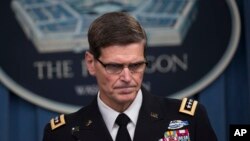The top U.S. commander for the Middle East made a secret visit to Syria on Saturday to look at cooperative efforts among Arab, Kurdish and other forces to overcome Islamic State militants.
Army General Joseph Votel, head of U.S. Central Command, spent nearly 11 hours in Syria, visiting locations where U.S. special operations forces are working with local fighters in the battle against IS.
Reporters accompanied Votel on his visit but, for security reasons, were not allow to disclose his trip until it was over.
Votel landed at a dusty outpost that serves as a U.S. camp for American military advisers who are training Syrian Arab troops in basic soldiering skills. Splitting off from the reporters, Votel then visited several other undisclosed locations in Syria before returning to the camp.
He spent time with not only U.S. service personnel but also top officers of the Syrian Democratic Forces, who have requested arms and ammunition from the United States.
Aides said Votel's flight into Syria was the first made in daylight by U.S. forces, who have about 200 advisers on the ground but no combat units. President Barack Obama has ruled out a U.S. ground combat role.
'Increased confidence'
In an interview as he prepared to leave Syria, Votel said his visit had hardened his belief that the U.S. is taking the right approach to developing local forces to fight IS. "I left with increased confidence in their capabilities and our ability to support them,'' he said.
The U.S. has struggled to find an effective ground force to take on IS in Syria. The problem is complicated by the fractured nature of the opposition to the government of President Bashar al-Assad. The U.S. is trying to develop credible Arab fighters to retake Raqqa, the Islamic State's self-declared capital, while Syrian Kurds have retaken territory from IS in other parts of northern Syria.
The U.S. is supporting the Syrian Democratic Forces, mostly made up of Syrian Kurds, numbering at least 25,000 fighters, with a smaller element of Syrian Arabs, numbering perhaps 5,000 to 6,000. The U.S. is trying to increase the Arab numbers.
Ban assails obstacles to aid
U.N. Secretary-General Ban Ki-moon addressed the Syria conflict in Doha, Qatar, on Saturday, saying at the annual Doha Forum that the Syrian government was continuing to use barrel bombs on civilians and putting "unconscionable and unlawful obstacles in the way of humanitarian aid." He said, "Is there anything more urgent than resolving that nightmare?"
Ban's comments came just days after an international meeting in Vienna where delegates from world and regional powers proposed turning a lull in the fighting in Syria into a long-lasting cease-fire.
More than 20 countries participating also agreed to increase their humanitarian aid to Syria. Many Syrian civilians surrounded by the violence have found themselves cut off from supplies of food and medicine for prolonged periods.
In his comments Saturday, Ban cautioned against "shortsighted policies and heavy-handed approaches" to confronting the extremists, saying they only exacerbate tensions. He called for a "full and immediate cessation of hostilities" followed by discussions about what kind of transitional leadership should follow.
Some information for this report came from AP.





